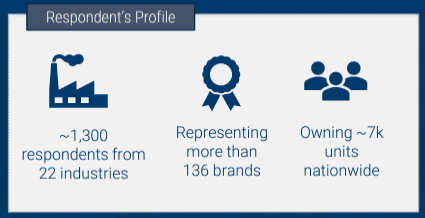Inflation is a force that can significantly impact businesses, and for franchise owners, understanding its effects is crucial for long-term success. Through a comprehensive longitudinal study we , we’ve gained valuable insights into how inflation is shaping the landscape for franchisee businesses. This year’s study builds upon the foundation laid by last year’s research, providing us with an even clearer picture of the challenges and opportunities that lie ahead.
Increased Participation and Diverse Perspectives

FRANdata IFA Inflation Study
The response to this year’s study was outstanding, with nearly 1,300 franchisees providing valuable feedback. Compared to last year, we saw an uptick in participation, showcasing a growing interest in understanding the dynamics of inflation within the franchise industry. Among the respondents, 55% were single-unit operators, and 45% were multi-unit operators, offering a balanced representation of the industry’s diverse landscape.
We extend our gratitude to all those who played a role in encouraging franchise owners to participate in this study. Special thanks to individuals like Catherine Bartley and the dedicated team at the International Franchise Association (IFA) for their tireless efforts in gathering valuable data.
Key Takeaways
- Persistent Negative Impact on Earnings: For the second consecutive year, franchisees reported a negative impact on their earnings due to inflation. This trend underscores the urgent need for proactive strategies to mitigate these effects.
- Anticipated Continued Rise in Costs: Franchisees expect costs to continue their upward trajectory. Without effective solutions, the negative impact on earnings will only escalate, necessitating swift and informed action.
- Talent Acquisition and Retention Remain a Challenge: Finding and retaining talent continues to be the foremost challenge for franchisees. As costs rise, owners face the dilemma of either paying more to attract skilled individuals or allocating resources for training, further amplifying the inflationary pressures on earnings. The food service industry has been particularly hard-hit by escalating labor costs.
- Shift in Concerns: Insurance-related costs have emerged as a significant concern this year, whereas they weren’t as prominent in the previous study. This shift highlights the evolving nature of challenges within the industry. On the other hand, while rising fuel costs remain a consideration, they have somewhat diminished in significance compared to last year.
- Pricing Strategies Vary: Most franchisees are implementing price increases, with a notable increase compared to the previous year. However, it’s worth noting that smaller franchisees are not adjusting prices to the same extent as their larger counterparts, aligning with last year’s findings.
- Increased Time Investment and Personal Liquidity: Franchisees are reporting that they are spending more time in their businesses and are injecting personal liquidity to navigate the challenges posed by inflation. This adaptive response highlights the resilience and resourcefulness of franchise owners.
- The Franchisee Network: A Source of Support: In times of economic uncertainty, franchisees have the invaluable resource of a network of fellow franchisees and a franchisor to lean on for support. Collaborative efforts and shared insights can serve as a powerful means to combat the impacts of inflation.
The longitudinal study on inflation’s impact on franchisee businesses provides us with a comprehensive understanding of the challenges and opportunities facing this dynamic industry. Armed with these insights, stakeholders can work together to develop innovative strategies that empower franchisees to thrive in the face of inflationary pressures. Together, we can chart a course toward sustained success and growth.


